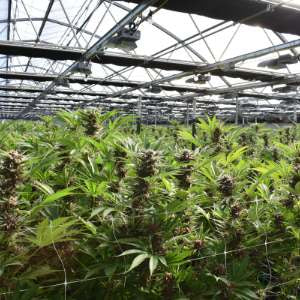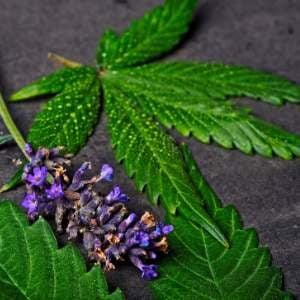Zaza Blogs
THCa vs. THC: Which Cannabinoid Packs a Bigger Punch?
Are you intrigued by the complex world of cannabis? With over 400 chemical compounds in the cannabis plant, including cannabinoids, terpenoids, and flavonoids, it’s no wonder that enthusiasts are keen to understand the differences between THCa and THC. This comprehensive guide will explore these two cannabinoids, their effects, and which one offers a stronger experience. What is THCa? THCa, or tetrahydrocannabinolic acid, is one of the primary cannabinoids found in raw cannabis plants. Unlike THC, THCa is non-psychoactive, meaning it won't get you high in its natural state. Think of THCa as the raw version of THC—similar to how CBD operates. Consuming raw cannabis containing THCa won’t produce intoxicating effects but offers potential therapeutic benefits. Decarboxylation: The Transformation from THCa to THC The magic happens during a process called decarboxylation, where THCa is converted into THC through heat, aging, or even light exposure. When cannabis is smoked, vaped, or cooked, this heat removes a carboxylic acid group from THCa, releasing carbon dioxide (CO2) and transforming it into the psychoactive THC. What is THC? THC, or delta-9-tetrahydrocannabinol, is the most well-known cannabinoid. It’s responsible for the characteristic “high” associated with cannabis use. When THC binds to cannabinoid receptors in the brain, it activates the endocannabinoid system, producing various psychoactive effects. While THCa is prevalent in fresh cannabis, THC is typically found in dried and cured products. Comparing the Effects of THCa and THC When you consume cannabis through smoking or vaping, the heat converts THCa to THC, resulting in similar psychoactive effects. Here’s what you can expect from both: Relaxation and Euphoria: Both cannabinoids can induce feelings of relaxation and happiness. Increased Appetite (Munchies): Commonly reported with both THCa and THC. Creativity and Focus: Some users find that certain strains enhance creativity or improve focus. Sleepiness or Energy: The effects can vary by strain—indica strains are relaxing, while sativa strains can be energizing. However, overconsumption of either can lead to unwanted side effects such as anxiety, dry mouth, and dizziness. Strength and Potency: THCa vs. THC Which One Hits Harder? The potency of THCa and THC isn’t straightforward. When smoked or vaped, THCa effectively becomes THC, meaning their psychoactive effects are equivalent. However, THCa products may deliver stronger effects due to their higher initial concentrations. For instance, a typical THC strain has about 15-25% THC content, while high-THCa strains can reach 30-40% THCa. Considering that approximately 87.7% of THCa converts to THC, a high-THCa product could potentially yield a higher overall THC content than a standard THC strain. The Role of Terpenes in Your Experience Terpenes are aromatic compounds found in cannabis that affect both flavor and effects. Some common terpenes include: Myrcene: Promotes relaxation and sedation. Limonene: Acts as a mood booster and stress reliever. Pinene: Enhances alertness and may counteract THC’s memory impairment. Linalool: Known for its calming effects. Caryophyllene: Interacts with the endocannabinoid system for added pain relief. Understanding the terpene profile of your cannabis can help you choose products that align with your desired effects. Consumption Methods: How They Affect Your High The way you consume THCa or THC significantly influences the experience. Vaping and Smoking: These methods provide immediate effects by decarboxylating THCa in real-time, producing an instant high. Edibles: These offer a delayed onset but can lead to stronger and longer-lasting effects. Always start with a low dose to gauge your tolerance. Raw Consumption: Juicing raw cannabis allows you to benefit from THCa without the psychoactive effects, making it a popular choice for wellness. THCa or THC: Which Should You Choose? Key Considerations Legal Status: Following the 2018 Farm Bill, hemp-derived THCa is legal federally and in many states, while THC remains a controlled substance in several regions. Always check local laws before purchasing. Tolerance Level: New users may find THC products more familiar and manageable, while seasoned users might prefer experimenting with high-THCa options for a stronger experience. Recommendations for Beginners If you're new to cannabis, consider starting with lower concentrations of THCa or THC. Try smoking or vaping small amounts to quickly assess your reaction. Some beginner-friendly strains include: Blue Dream Mango Dream White Cherry Gelato Options for Experienced Users For seasoned cannabis enthusiasts, delving into high-THCa or THC products can elevate your experience. Explore: High-Potency Flower Strains: Look for varieties like Mr. Nasty or Gorilla Glue. Concentrates: THCa diamonds offer a potent experience. Dabbing and Bongs: These methods provide immediate and intense effects. Ready to Explore THCa and THC? If you’re eager to try THCa hemp flower, check out our extensive selection at Bay Smokes. All products are locally sourced and third-party lab tested for quality and potency. Whether you’re interested in THCa flower, vapes, or concentrates, we have something for everyone! Frequently Asked Questions (FAQ) What is high THCa? High THCa refers to cannabis products with a THCa percentage typically above 25%. Does THCa convert to Delta-9 THC? Yes, when heated, THCa converts to Delta-9 THC. Is THCa more psychoactive than THC when heated? When heated, THCa becomes THC and produces comparable psychoactive effects. Which has stronger psychoactive effects, THCa or THC? Both produce equal psychoactive effects once THCa is converted to THC through heat. Will I fail a drug test if I smoked THCa? Yes, THCa can lead to a failed drug test as it is similar to THC. Explore the world of THCa and THC today, and find the right product for your needs
Learn moreHow Long Does THCA Stay in Your System?
If you're using THCA (Tetrahydrocannabinolic acid) for its potential benefits, understanding how long it can remain in your system is crucial, especially if a drug test is on the horizon. In this guide, we’ll delve into the factors affecting THCA detection times, the implications for drug tests, and tips for managing your cannabis consumption effectively. What is THCA? THCA is a prominent cannabinoid found in raw cannabis plants. Unlike THC, its psychoactive counterpart, THCA is non-psychoactive in its natural form. However, when exposed to heat through smoking, vaping, or cooking, THCA undergoes decarboxylation, transforming into THC, which is responsible for producing the "high" associated with cannabis use. This transformation is significant, as it directly relates to drug testing and how THCA can be detected in your body. How Long Does THCA Stay in Your System? The duration that THCA remains in your system is not a straightforward answer; it varies based on several factors, including frequency of use, metabolism, and consumption methods. Here’s a general breakdown: Light/Occasional Users: THCA may remain detectable for approximately 3–5 days. Heavy Users: Those who use THCA more frequently could find it detectable for 10–30 days or longer. Key Factors Affecting THCA Detection Times Metabolic Rate: Individuals with a faster metabolism may clear THC metabolites more quickly than those with slower metabolic rates. Frequency of Use: Occasional users tend to process THCA faster than daily users, who may accumulate more THC metabolites. Body Fat Percentage: Since THC is fat-soluble, higher body fat can result in longer retention of THC metabolites. Consumption Method: Edibles, which must pass through the digestive system, can lead to longer detection times than smoking or vaping. Dosage: Higher consumption levels can lead to increased THC metabolite retention in your Does THCA Show Up on a Drug Test? Yes, while most standard drug tests don’t specifically look for THCA, they test for THC metabolites like THC-COOH, which your body produces when breaking down THCA. These metabolites can remain in your system longer than active THC, potentially resulting in a positive drug test even if you don't feel "high." Detection Windows for Various Drug Tests Different drug testing methods have varied detection windows for THCA and its metabolites: Blood Tests: Typically used in situations like DUIs, they can detect active THC for Occasional Users: Up to 1-2 days Frequent Users: Up to 7 day Urine Tests: The most common testing method, with detection times of: Occasional Users: 3-5 days Moderate Users: About 1 week Heavy Users: 10-30 days or more Saliva Tests: These tests can detect recent use for: Occasional Users: Up to 72 hours Regular Users: Up to 1 week Sweat Tests: Typically used for ongoing monitoring, these can detect THC metabolites for: All Users: 1 week or longer Hair Tests: These tests can provide a long history of cannabis use, detecting THC for: All Users: Up to 90 days or more Tips for Clearing THC Metabolites from Your System If you’re facing an unexpected drug test, there’s no guaranteed method to quickly cleanse your system of THC metabolites. However, you can support your body’s natural detoxification processes: Exercise: Regular physical activity can help burn fat and release stored THC metabolites. Stay Hydrated: Drinking plenty of water can assist your kidneys in flushing out toxins. Eat a Balanced Diet: Consuming fruits, vegetables, and high-fiber foods can support liver and kidney function. Give it Time: Patience is essential, as your body requires time to process and eliminate metabolites naturally. Be Cautious with Detox Products: While some supplements claim to expedite detoxification, many lack scientific support. Use them as part of a healthy routine rather than relying on them as a cure-all. Where to Find Quality THCA Products If you’re looking to incorporate THCA into your wellness routine, consider reputable sources like Bay Smokes. They offer a variety of lab-tested THCA products, including flowers, concentrates, edibles, and more, ensuring quality and compliance with federal regulations. FAQs 1. How long will one hit of a cart stay in your system? A single puff may be detectable for about 1–3 days, depending on individual factors. 2. How much THCA is needed for a positive test? Even small amounts of THCA can lead to detectable THC metabolites, influenced by personal body chemistry and usage frequency. 3. How long does THC stay in a heavy user’s body? For heavy users, THC can be detected in urine for over 30 days. 4. Is THCA detectable in saliva tests? Yes, THCA can be detected in saliva tests for up to 72 hours. 5. How long does a THCA high last? A THCA high typically lasts 1-3 hours for smoking/vaping and 4-8 hours for edibles. By understanding these factors, you can make informed choices about your cannabis consumption and navigate drug testing with confidence.
Learn moreCultivation
Cultivating THCa requires a delicate balance of precise environmental control and expert knowledge of cannabis genetics, where the goal is to maximize the acid form of THC without decarboxylation. This process not only preserves the unique therapeutic properties of THCa but also opens the door to creating products with potent effects.
Learn moreEffects of THCa
Smoking THCa provides a unique experience, as the compound converts into THC when heated, delivering a potent and immediate psychoactive effect. This transformation offers both the therapeutic benefits of THCa and the classic euphoria associated with traditional cannabis, making it a versatile option for users seeking a dynamic experience.
Learn moreFlavor Profile
The flavor profile of cannabis products is a complex symphony of terpenes, offering notes that range from earthy pine and rich citrus to sweet floral and spicy pepper. Each strain's unique blend of these aromatic compounds creates a sensory experience that enhances the overall enjoyment and effects of the cannabis.
Learn more




